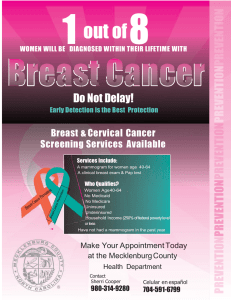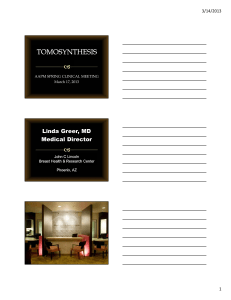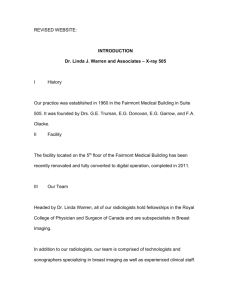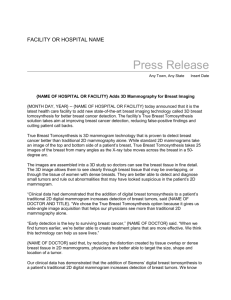Theory and Practice of Breast Tomosynthesis Andy Smith, Ph.D. Director, Imaging Science
advertisement
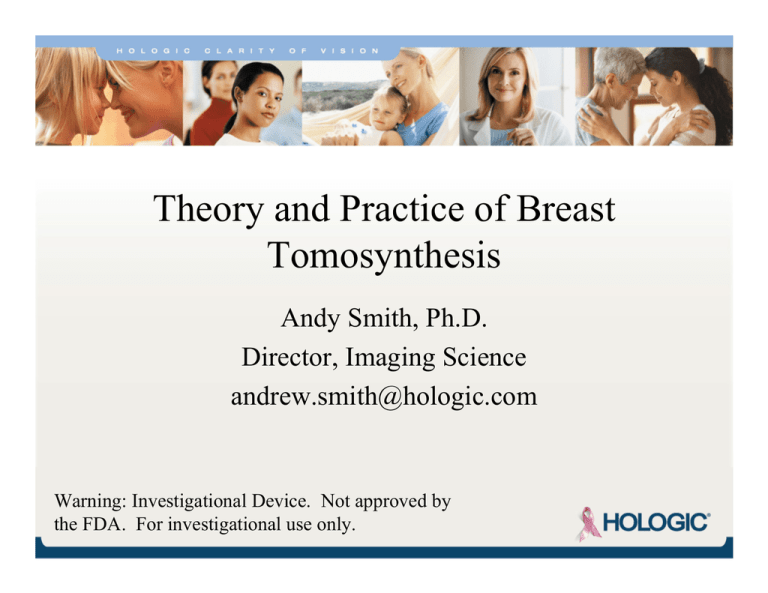
Theory and Practice of Breast Tomosynthesis Andy Smith, Ph.D. Director, Imaging Science andrew.smith@hologic.com Warning: Investigational Device. Not approved by the FDA. For investigational use only. Talk Outline • • • • • • • What is breast tomosynthesis? Why do breast tomosynthesis? How does breast tomosynthesis work? How do we use it clinically? Clinical examples What is its clinical performance? Summary of advantages What is Breast Tomosynthesis? • A method of imaging the breast in three dimensions (3D) • Image slices are 1 mm thick • Image slices high resolution: like mammograms Why do Breast Tomosynthesis? • Because 2D images have tissue superposition • 2D hides cancers • 2D makes normal tissue look like pathology • Clearer images Conventional 2-D Imaging Incident X-rays Objects being imaged, at different heights Images superimposed on image 2-D image Potential Clinical Advantages of Tomosynthesis • • • • Better sensitivity Fewer recalls Potential for lower dose Potential for less compression Better Sensitivity Removal of confusing overlying tissue makes for clearer imaging Better Sensitivity • ACR Phantom imaged with 4 cm cadaverous breast • Phantom has low contrast fibers, masses, and calcifications • Overlying breast tissue obscures object visibility Better Sensitivity Digital Mammogram 1X dose Tomosynthesis 1X dose Slice at plane of phantom insert Tomosynthesis shows improved low contrast visibility over digital mammography 2D Mammogram Tomosynthesis Better Sensitivity Fewer Recalls Removal of confusing overlying tissue makes for clearer imaging 2D Mammogram Tomosynthesis Fewer Recalls Superimposed Tissue from Different Levels in the Breast Resolved with TOMO FFDM TOMO slice 28 TOMO slice 43 TOMO slice 55 Potential for Lower Dose • Reduced superimposed tissue reduces need for very low quantum noise • Fewer recalls reduce additional diagnostic exposures • Only one view needed? Unfortunately, probably not. Lower Dose • Phantom studied as function of tomosynthesis dose Lower Dose Digital Mammogram 4X dose Tomosynthesis 0.5X dose Slice at plane of phantom insert Tomosynthesis shows improved low contrast visibility over FFDM, even at much lower dose Potential for Less Compression • Compression not needed to minimize tissue overlap (structure noise) • Still need compression to reduce patient motion How does tomosynthesis work? • Image the breast from several angles • Use the multiple images to reconstruct the 3D dataset • Process is very similar to CT imaging: view the body from different angles and reconstruct the volume Tomosynthesis Acquisition X-ray tube Compression plate Reconstructed planes Breast Digital detector • X-ray tube moves in an arc across the breast • Series of low dose images are acquired at different angles • Total dose similar to single view breast exam Tomosynthesis Acquisition Image from multiple angles Incident X-rays Objects being imaged 2-D raw data images Exposure #1 Exposure #8 Exposure #15 Tomosynthesis Reconstruction Appropriate shifting and adding of raw data reinforces objects at specific height Data Formats Tomo… the movie! How to use tomo clinically • Choice is to take either 2D, 3D or both 2D+3D in one examination • Can take tomo images in CC, MLO, or any standard mammography view • Clinical experience is with CC + MLO, both 2D and 3D • Doing both 2D and 3D requires additional dose… • Unclear what is needed long term Do we need both CC and MLO? OLD NEWS… RSNA 2004 Breast Tomosynthesis: Will a Single View Do? Rafferty, Kopans, Wu, Moore Conclusion: MLO tomo is adequate LATEST NEWS… RSNA 2006 Breast Tomosynthesis: One View or Two? Rafferty, Niklason, Jameson-Meehan. 34 Lesions, imaged both CC and MLO tomo. 65% seen equally on both 12% more visible on MLO 15% more visible on CC 9% only seen on CC (all malignant). → lesions have both spherical & planar components → tomosynthesis clinical use likely to need 2 views Clinical Examples • Collected from six sites: – MGH Boston MA USA – Dartmouth Hitchcock Medical Center, Lebanon NH USA – University of Iowa, Iowa City, IA USA – Magee Women’s Hospital, Pittsburgh, PA USA – Yale University, New Haven, CT USA – AVL Cancer Hospital, Amsterdam Holland FFDM IMAGE FFDM IMAGE TOMO IMAGE FFDM IMAGE FFDM IMAGE TOMO IMAGE Digital Mammogram Tomosynthesis Image Recalled for subtle architectural distortion. Tomo shows two adjacent spiculated Case 030928 masses. Multifocal invasive lobular carcinoma. Digital Mammogram Tomosynthesis Image Recalled for subtle architectural distortion. Tomo shows two adjacent spiculated Case 030928 masses. Multifocal invasive lobular carcinoma. Digital Mammogram Tomosynthesis Image Recalled for subtle architectural distortion. Tomo shows two adjacent spiculated Case 030928 masses. Multifocal invasive lobular carcinoma. Digital Mammogram Tomosynthesis Mammographically occult biopsy proven cancer Digital Mammogram Tomosynthesis Mammographically occult biopsy proven cancer Digital Mammogram Tomosynthesis Mammo false positive: benign. Superimposed parenchyma Digital Mammogram Tomosynthesis Mammo false positive: benign. Superimposed parenchyma Tomo clinical performance RSNA 2007 Assessing Radiologist Performance Using Combined Full-Field Digital Mammography and Breast Tomosynthesis Versus FullField Digital Mammography Alone: Results of a Multi-Center, Multi-Reader Trial E Rafferty, L Niklason, et al. • 1083 women imaged • 316 women in reader study with 12 radiologists • Study performance 2D vs. 2D+3D → Sensitivity increased from 66% to 76% → Specificity increased from 81% to 89% → Recall rate reduced by 43% Tomo clinical performance Summary of tomo advantages • • • • Better sensitivity Fewer recalls Potential for lower dose Potential for less compression Tomo Acquisition Thank You.

